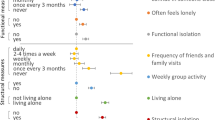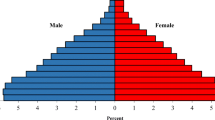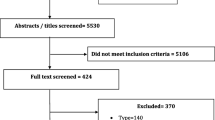Abstract
In Portugal, individuals aged 50+ have an important role in the provision of co-residential care. This study aimed to rank Portugal relative to 15 European countries with regard to the prevalence of co-residential care (daily or almost daily personal care), and extra-residential help/care (household help and/or personal care) provided by individuals aged 50+, and determine the factors associated with the provision of these types of support in the Portuguese context. The study used data from the SHARE wave 4 project (2010–2011) and was based on an analysis of variance and logistic regression models. Portugal differs from other European countries, as it has the highest rate of co-residential care (12.4 %) and the lowest rate of provision of extra-residential help/care (10.8 %). It is concluded that the quality of life (QoL) of Portuguese co-residential carers is lower than the QoL of non-carers, but extra-residential help/care provided once a month or less has a positive impact on the QoL of the providers. Co-residential care and the provision of frequent extra-residential help/care (daily or weekly) were associated with a higher number of depressive symptoms. The results further showed that, in Portugal, co-residential carers and extra-residential helpers/carers have different socio-demographic, economic and health characteristics. This study demonstrates that it is important for scientific research to differentiate the type and frequency of informal support, since this can help us design policies to meet the specific needs of the various types of informal carers aged 50+.


Similar content being viewed by others
References
Alber J, Kohler U (2004) Health and care in an enlarged Europe. Office for Official Publications of the European Communities, European Foundation for the Improvement of Living and Working Conditions, Luxembourg
António S (2013) Das Políticas Sociais da Velhice à Política Social do Envelhecimento. In: Carvalho MI (ed) Serviço Social no Envelhecimento. Pactor, Lisboa, pp 81–104
Barrow S, Harrison R (2005) Unsung heroes who put their lives at risk? Informal caring, health and neighbourhood attachment. J Public Health 27:292–297. doi:10.1093/pubmed/fdi038
Brandt M, Haberkern K, Szydlik M (2009) Intergenerational Help and Care in Europe. Eur Sociol Rev 25:585–601. doi:10.1093/esr/jcn076
Burr JA, Mutchler JE, Caro FG (2007) Productive activity clusters among middle-aged and older adults: intersecting forms and time commitments. J Gerontol Ser B, Psychol Sci Soc Sci 62:S267–S275
Callegaro L, Pasini G (2008) Informal care and labour force participation: the economics of family networks. In: Börsch-Supan A, Brugiavini A, Jürges H, Mackenbach J, Siegrist J, Weber G (eds) First results from the Survey of Health, Ageing and Retirement in Europe (2004-2007). MEA, Mannheim, pp 197–203
Carvalho M (2012) Envelhecimento e Cuidados Domiciliários em Instituições de Solidariedade Social. Coisas de Ler Edições, Lisboa
Colombo F, Llena-Nozal A, Mercier J, Tjadens F (2011) Help Wanted? Providing and Paying for Long-Term Care. OECD Health Policy Studies, OECD Publishing. http://dx.doi.org/10.1787/9789264097759-en
Daatland SO (2001) Ageing, families and welfare systems: comparative perspectives. Zeitschrift für Gerontologie und Geriatrie 34:16–20
De Koker B (2009) Socio-demographic determinants of informal caregiving: co-resident versus extra-resident care. Eur J Ageing 6:3–15. doi:10.1007/s10433-008-0103-7
Dewey M, Prince M (2005) Mental Health. In: Borsch-Supan A, Jurges H (eds) Health, ageing and retirement in Europe––First results from survey of health, ageing and retirement in Europe. Mannheim Research Institute for the Economics of Ageing (MEA), Mannheim, pp 108–117
Ekwall AK, Sivberg B, Hallberg IR (2005) Loneliness as a predictor of quality of life among older caregivers. J Adv Nurs 49:23–32. doi:10.1111/j.1365-2648.2004.03260.x
Eriksen ML, Vestergaard S, Andersen-Ranberg K (2013) Health among Europeans––a cross-sectional comparison of 16 SHARE countries. In: Borsh-Supan A, Brandt M, Litwin H, Weber G (eds) Active ageing and solidarity between generations. First results from SHARE after the economic crisis, De Gruyter, Germany, pp 149–160
European Commission (2012) The 2012 ageing report: economic and budgetary projections for the 27 EU Member States (2010–2060), European Economy 2/2012. European Commission, Brussels
Glendinning C, Arkey H, Tjadens F, Moree M, Moran N, Nies H (2009) Care provision within families and its socio-economic impact on care providers across European Union Research Works, 2009-05. University of York, York
Hank K (2011) Societal Determinants of Productive Aging: A Multilevel Analysis across 11 European Countries. Eur Sociol Rev 27:526–541. doi:10.1093/esr/jcq023
Herrera AP, Mendez-Luck CA, Crist JD, Smith ML, Warre R, Ory MG, Markides K (2013) Psychosocial and cognitive health differences by caregiver status among older Mexican Americans. Community Ment Health J 49:61–72. doi:10.1007/s10597-012-9494-1
Hosseinpoor AR, Bergen N, Chatterji S (2013) Socio-demographic determinants of caregiving in older adults of low- and middle-income countries. Age Ageing 42:330–338. doi:10.1093/ageing/afs196
Hyde M, Wiggins RD, Higgs P, Blane DB (2003) A measure of quality of life in early old age: the theory, development and properties of a needs satisfaction model (CASP-19). Aging Ment Health 7:186–194. doi:10.1080/1360786031000101157
Igel C, Brandt M, Haberken K, Szydlik M (2009) Specialization between family and state. International time transfers in western Europe. J Comp Fam Stud 40:203–227
INE (2012) Census 2011 Resultados Definitivos––Portugal. Instituto Nacional de Estatística, Lisboa
INE (2013) Estatísticas Demográficas 2012. Instituto Nacional de Estatística, Lisboa
INE/PORDATA (n.a.). Inquérito ao Emprego. Retrieved May 7, 2014, from http://www.pordata.pt/Portugal/Taxa+de+desemprego+total+e+por+sexo+(percentagem)+(R)-550
Isengard B, Szydlik M (2012) Living apart (or) together? coresidence of elderly parents and their adult children in Europe. Res Aging 34:449–474. doi:10.1177/0164027511428455
Lyberaki A, Tinios P, Mimis A, Georgiadis T (2013) Mapping population aging in Europe: how are similar needs in different countries met by different family structures? J Maps 9:4–9. doi:10.1080/17445647.2012.752334
Motel-Klingebiel A, Tesch-Roemer C, Von Kondratowitz HJ (2005) Welfare states do not crowd out the family: evidence for mixed responsibility from comparative analyses. Ageing Soc 25:863–882. doi:10.1017/S0144686X05003971
Netuveli G, Wiggins RD, Hildon Z, Montgomery SM, Blane D (2006) Quality of life at older ages: evidence from the english longitudinal study of aging (wave 1). J Epidemiol Community Health 60:357–363. doi:10.1136/jech.2005.040071
OECD (2013) Health at a glance 2013: OECD Indicators. OECD Publishing. http://dx.doi.org/10.1787/health_glance-2013-en
Ogg J, Renaut S (2006) The support of parents in old age by those born during 1945–1954: a European perspective. Ageing Soc 26:723–743. doi:10.1017/S0144686X06004922
Pickard L, King D (2012) Modelling the future supply of informal care for older people in Europe. In: Geerts J, Willemé P, Mot E (eds) Long-term care use and supply in Europe: projections for Germany, The Netherlands. Spain and Poland, Ancien, Belgium, pp 76–106
Portugal S (2007) O que faz mover as redes sociais?. Uma análise crítica das normas e dos laços, Revista Crítica de Ciências Sociais
Portugal S (2008) As mulheres e a produção de bem-estar em Portugal. Oficina do CES
Prince M, Beekman A, Deeg D, Fuhrer R, Kivela S, Lawlor B, Lobo A et al (1999) Depression symptoms in late life assessed using the EURO-D scale. Effect of age, gender and marital status in 14 European centres. British J Psychiatry 174:339–345
Rodrigues R, Huber M, Lamura G (2012) Facts and Figures on Healthy Ageing and Long Term Care. European Centre for Social Welfare Policy and Research, Vienna
Rösler-Schidlack B, Stummer H, Ostermann H (2011) Health-related quality of life of family caregivers-evidence from Hesse. J Public Health 19:269–280. doi:10.1007/s10389-010-0369-z
Santana S, Dias A, Souza E, Rocha N (2007) The domiciliary support service in Portugal and the change of paradigm in care provision. Int J Integr Care 7:1–8
Sarasa S, Mestres J (2005) Women’s employment and the adult caring burden. DemoSoc Working Paper 2005–2007
Wahrendorf M, Ribet C, Zins M, Siegrist J (2008) Social productivity and depressive symptoms in early old age–results from the GAZEL study. Aging Ment Health 12:310–316. doi:10.1080/13607860802120805
Acknowledgments
This study was funded by the Portuguese Foundation for Science and Technology–FCT (SFRH/BD/72257/2010), and SHARE w4 data collection in Portugal was financed by European Commission (Employment, Social Affairs and Equal Opportunities DG, grant number VS/2009/0562) and Portuguese High Commissioner for Health.
Author information
Authors and Affiliations
Corresponding author
Additional information
Responsible Editor: Paula C. Albuquerque (guest editor) and H. Litwin.
Rights and permissions
About this article
Cite this article
Barbosa, F., Matos, A.D. Informal support in Portugal by individuals aged 50+. Eur J Ageing 11, 293–300 (2014). https://doi.org/10.1007/s10433-014-0321-0
Published:
Issue Date:
DOI: https://doi.org/10.1007/s10433-014-0321-0




